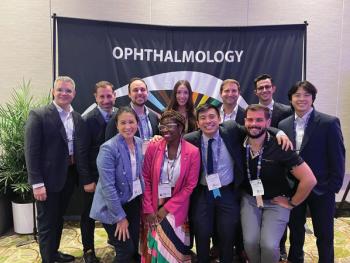
Investigational trials target VEGF/angiopoietin2 inhibition
By Cheryl Guttman Krader,Reviewed by Karl G. Casky, MD
Results from preclinical and phase I trials suggest that dual inhibition of vascular endothelial growth factor (VEGF) and angiopoietin2 (Ang2) has potential benefit for treating retinal vascular diseases. The combined approach have progressed to Phase II studies.
“Ang2 is a proangiogenic cytokine produced by endothelial cells,” explained Karl G. Casky, MD, PhD. “It is upregulated in pathologic neovascularization states, and its binding to the tyrosine kinase receptor, Tie2, on endothelial cells results in vessel destabilization and leakage.
“Therefore, strategies to inhibit both VEGF, which is proangiogenic and increases vessel permeability, and Ang2 may provide a better approach than anti-VEGF treatment alone for achieving endothelial cell stabilization in retinal vascular diseases,” Dr. Casky added.
Dr. Csaky is the T. Boone Pickens Director, Clinical Center of Innovation for AMD, and managing director and chief medical officer, Retina Foundation of the Southwest, Dallas, TX.
Novel monoclonal antibody
RG7716 (Roche) is an ophthalmic bispecific monoclonal antibody that contains an Fab fragment targeting VEGF and one that targets Ang2. In addition, the Fc portion of the antibody has been disabled to reduce binding to known Fc receptors with the hope of improving systemic safety by enabling faster systemic clearance and avoiding microthrombus formation.
In preclinical studies in mice and nonhuman primates, RG7716 was shown to reduce the severity grade of laser-induced choroidal neovascular leakage to a greater degree than treatment with VEGF or Ang2 inhibition alone.
A phase I clinical trial of RG7716 for treatment of neovascular age-related macular degeneration (nAMD) enrolled patients who had persistent retinal fluid despite having received at least 3 intravitreal anti-VEGF injections in the preceding 6 months. It began with a single dose escalation study that was followed by a multidose escalation trial in which patients received 3 injections 4 weeks apart.
In both the single dose and multidose studies, the mean time to as needed reinjection was longer than in the prestudy period when patients were receiving anti-VEGF injection alone. Among the 6 patients receiving the highest dose of RG7716 (6 mg) in the multidose study, a treatment benefit was also noted in Optical coherence tomography (OCT)-measured central subfield thickness. Reduction in retinal thickness was achieved in all 6 patients at 28 days after the last dose. The median change from baseline was 117 µm.
“These patients represented difficult cases who had an average disease duration of 2.9 years prior to study enrollment,” said Dr. Csaky who is also a partner at the Texas Retina Associates, Dallas.
RG7166 was well tolerated. There were no dose limiting events, unexpected adverse events, or flags regarding systemic safety. A total of 14 ocular adverse events were reported, including 1 case of moderate iritis. All other ocular adverse events were judged to be mild in severity.
Fixed combination
Regeneron Pharmaceuticals also is exploring combination Ang2/VEGF inhibition using an anti-Ang2 antibody, nesvacumab, combined with its anti-VEGF agent, aflibercept (Eylea).
In preclinical vascular development models, the combination was more effective than aflibercept alone in inhibiting retinal vessel growth, and in a prolonged retinal vascular leakage model in rabbits, the combination inhibited leakage for longer than aflibercept alone.
A phase I dose-escalation trial investigated the antiAng2 antibody coformulated with aflibercept 2 mg in a single 50 μL injection in patients with diabetic macular edema (DME) and treatment-naïve nAMD. Patients were given mandatory injections at baseline, week 4, and week 8 and then could be retreated with aflibercept as monotherapy as needed beginning at week 12.
The results showed that increasing doses of the anti-Ang2 antibody combined with aflibercept prolonged the duration to as needed retreatment in both the DME and nAMD subgroups. Patients treated with the 3 mg dose of nesvacumab also had improvements in visual acuity and OCT. Of the 8 patients in this subgroup, 6 did not require retreatment past the third mandatory injection.
The safety profile of the combination treatment approach was good with no significant adverse events occurring that were judged to be related to study medication.
On-going research
Both RG7716 and nesvacumab/aflibercept are being investigated as treatment for nAMD and DME in multicenter, randomized, double-masked, active-controlled phase II trials. The RG7716 nAMD study, known as AVENUE, has a 36-week duration with patients being treated up to week 28 or 32. It is evaluating different doses and dosing regimens of RG7716 alone or in combination with ranibizumab 0.5 mg (Lucentis, Genentech).
The DME study, BOULEVARD, is comparing 2 different doses of RG7716 with ranibizumab 0.3 mg. It has a 20-week treatment period followed by up to 16 weeks of observation.
ONYX is investigating 2 different dosing regimens of the fixed combination of nesvacumab/aflibercept against aflibercept in patients with nAMD, and the combination agent is being investigated for center-involving DME in RUBY. ONYX and RUBY both have a 36-week duration.
Karl G. Csaky, MD, PhD
This article is based on a presentation given by Dr. Csaky at the 2016 Retina Subspecialty Day meeting. Dr. Csaky is a consultant to Genentech, Roche, Regeneron, and other companies developing treatments for AMD and DME.
Newsletter
Keep your retina practice on the forefront—subscribe for expert analysis and emerging trends in retinal disease management.




